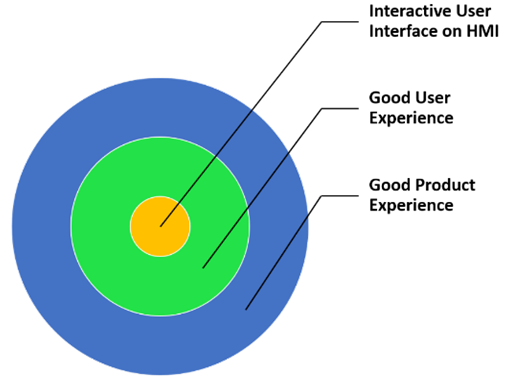Empowering a good user experience in SMART HMIs
Over the past few years, HMI has revolutionised the industrial experience, playing a leading role in transforming ‘Automation’ from hype to reality. From vending machines, infotainment kiosks, smart factories and automotive solution, HMI has become an integral part of everything ‘SMART’. Advancements in technology have contributed to a more functional and interactive experience.
The value of an HMI largely depends on a user-friendly and interactive design emphasising best practices for optimum user experience. A good product experience is the result of good user experience (UX) which is in chain dependent on the UI. A good user experience retains customer loyalty and a key building block for long term product success.

What defines a good user experience?
UX designs should always ensure that it meets the needs of the users and offer a positive and pleasant user experience. Good design focus on results and great design focus on User Experience (UX).
The properties of great user experience are:
- Avoid unnecessary visual element
- Few screens, Avoid transitions, and animations
- Intuitive
- Clear indication on the next steps and interactive experience
- Inclusive
- ‘Made for everyone’ ensuring ease of use across use
- Minimise reading
- Contains Graphical representations and infographic messages ( Sound /Bold icons/Colour )
- Reduce cognitive load through consistency
- Consistency in patterns, colors and element followed by smooth transition
How does iWave HMI offer good user experience?
While designing the HMI solution, iWave has taken deep consideration the goals, priorities and experience of customers who have market share in smart vending machines, interactive kiosks, smart home, industrial automation, automotive infotainment, and connected health care.
To enable a rich user experience, iWave has incorporated design elements across hardware components, range of industrial interfaces, wireless connectivity options, interactive touch display, rugged enclosure, and comprehensive software support. To satisfy the needs of diverse applications and enable flexibility for hassle free system integration, the company enables the HMI with both Linux and Android OS variants.
All interfaces are integrated into the pre-installed software and can be used directly. iWave has adapted the OS platforms with preinstalled open-source GUI libraries (Qt / Java / html5) to enable easy development of GUI applications. The large number of available libraries powers simple configuration to jumpstart the HMI application. A well-developed SDK with cross compiler reduces developer workload and complexity speeding up time to market.
iWave has partnered with Crank to provide a GUI rich Crank engine on demand. As per customer requirement, the preinstalled SW can be extended to support additional libraries and applications. An information rich user manual for GUI and other applications and extensive technical support from an experienced design service team guides user, minimise risks and aids in the quick development of their application.
GUI development on iWave HMI
It is very easy for the user to build a rich and interactive GUI on iWave’s HMI platform. All you need are GUI page content and proficiency in the GUI developer tool. The GUI developer tool instantly helps to create the GUI pages along with the interface routines and customised GUI images for various end applications requirements.
The source code is generated by the GUI developer tool which is cross compiled to generate programmable binaries. The generated application binary is then copied to the target HMI using a simple USB / Ethernet.





